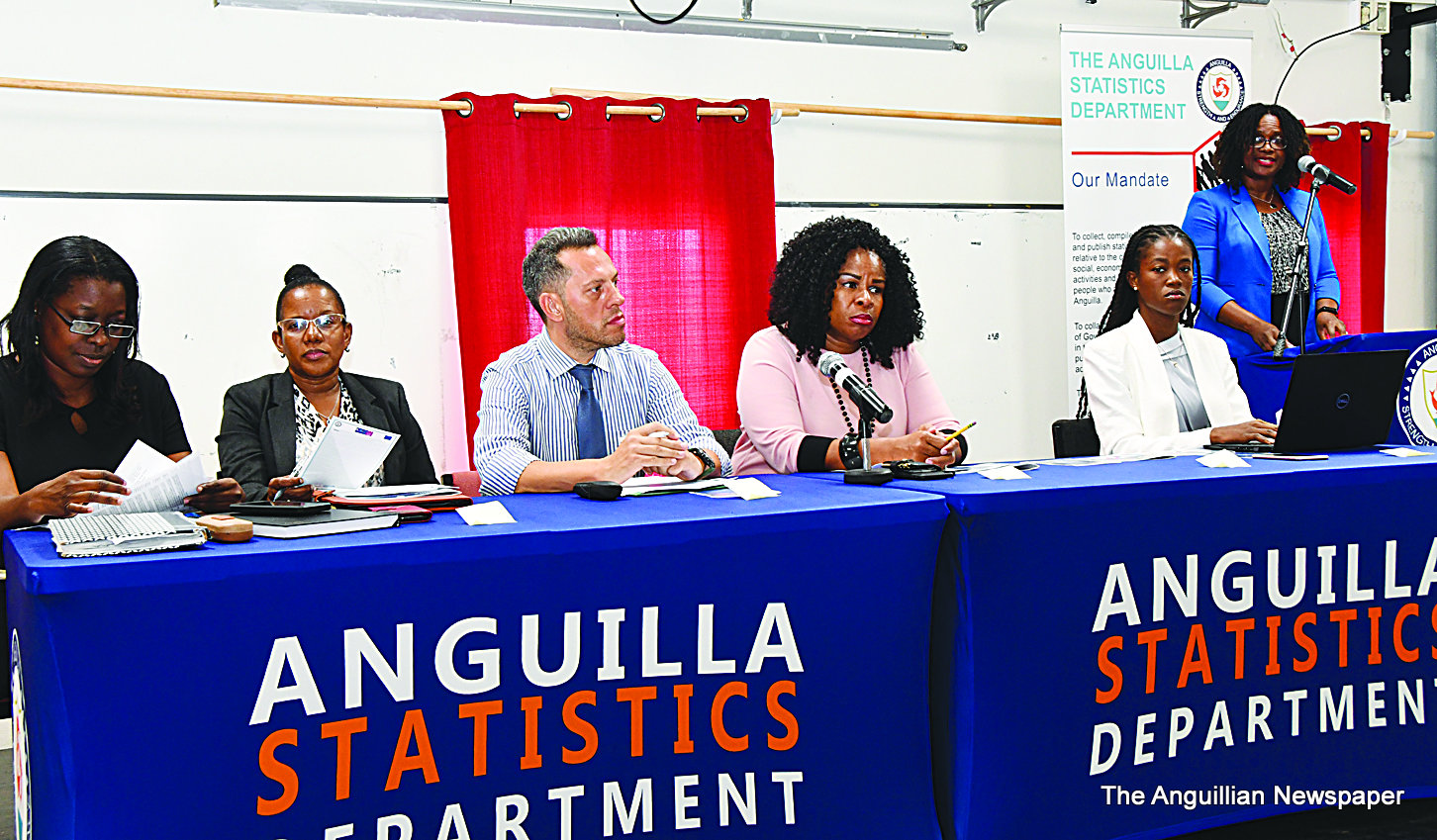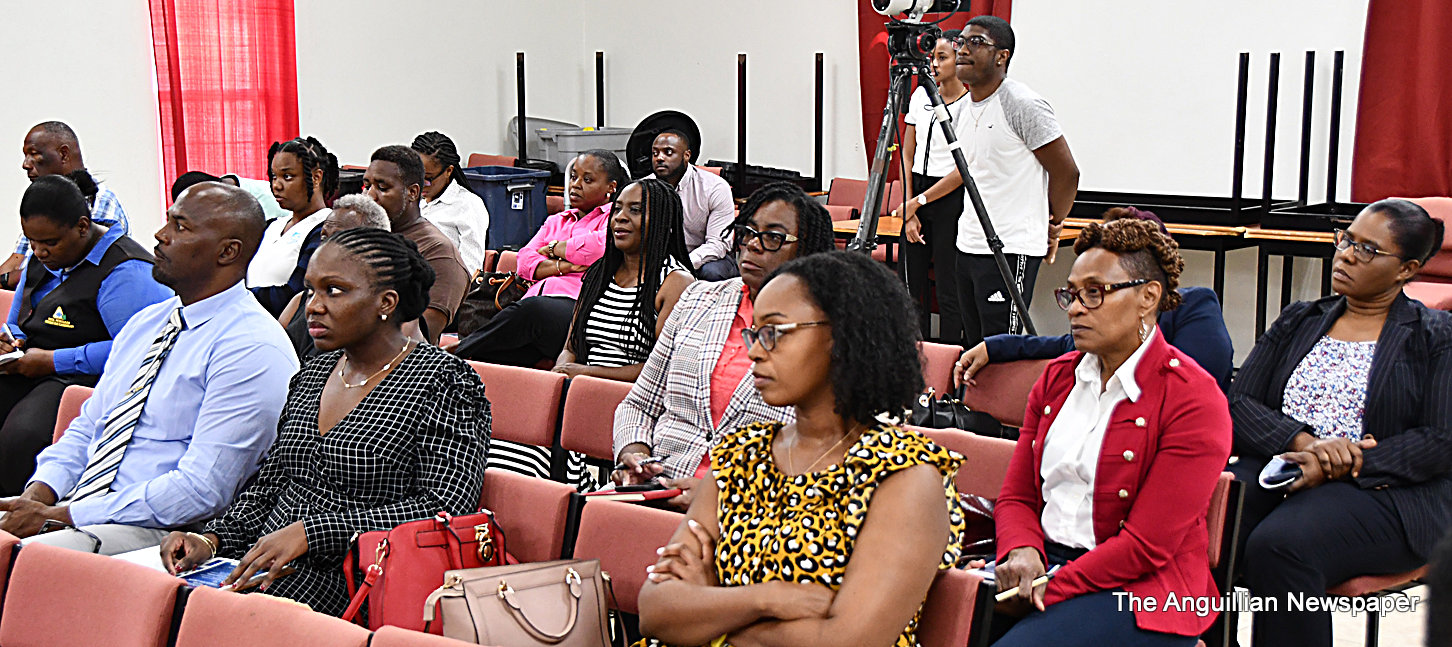
Notwithstanding the withdrawal of the United Kingdom from the European Union, the EU, as it is officially referred to, is assisting Anguilla with the capacity building of its labour market.
The assistance is in terms of “the collection and compilation of economic data in relation to the institutionalisation, conduct, and analysis of data from the labour force in the formal and informal sector for Anguilla.” This is according to an explanatory note circulated on Monday, March 15, at the commencement of an Anguilla Labour Market Survey meeting at the Teachers’ Resource Centre. The Stakeholders’ Sensitisation Session of the Survey was attended by a number of business persons from across the island, Ministers of Government and senior civil servants.
Permanent Secretary for Economic Development, Mrs. Chanelle Petty Barrett, put the Labour Market Survey Sensitisation Session into perspective when she addressed the opening ceremony. She was grateful to those in attendance “for taking the time to learn more about the survey, its rationale, importance and your role as key stakeholders in ensuring its success.”
She continued: “To say that this is long overdue is an understatement. For many years, the Anguilla Statistic Department and the Ministry of Economic Development have been lobbying for the conduct of a labour market and labour force survey. The department was supported in its advocacy by the Education Planning Unit, in the Ministry of Education, which saw the conduct of the survey as a means of obtaining critical data to assist in education planning.
“With the financial support of the European Union, through the European Development Fund, we are finally able to make this a reality. We express our deepest gratitude to the European Union – especially the Delegation to Barbados and the Eastern Caribbean for their continued support and guidance.
“The first of the surveys to be rolled out is the Anguilla Labour Market Survey. This will examine labour supply and demand. From an education standpoint, this is critical in ensuring that the education sector is producing or supplying what the market demands. It will demonstrate whether the training provided by education institutions is relevant for the labour market; whether the right skills are being developed to meet the needs of various industries; and whether there is a need to shift focus and its role and, if so, in what direction.”
Addressing the business persons in particular, Mrs. Petty Barrett told them: “I am sure that you can also easily see why this is important for businessowners and other organisations. Think about how much more efficient and productive your business organisation can be if there is a ready pool of persons with the skills that you need to choose from. When there is a skills mismatch between labour supply …and labour demand… the economy suffers.
“The Ministry of Economic Development is there a vested partner in this work. While the economy continues to feel the impact of various shocks, it is even more important that we have the kind of data that will assist in making decisions about mitigating potential economic threats – and propelling economic recovery. Additionally, it is worth noting that the support being provided by the European Union involves capacity building so that our very own Department of Statistics, on which we rely in calculating various economic indicators, will be empowered to conduct a survey on its own, going forward.”

She added: “This survey is central to Government’s ability to make meaningful plans for Anguilla’s development. It will ensure that we are channelling our interests and our scarce resources in the right areas; and, overtime, will result in you, as business persons, having access to the skills you need to get the job done.”
Minister of Education, Ms. Dee-Ann Kentish-Rogers, explained that the Ministry and the Department of Education have “everything to do with the Survey.” She stressed that: “The labour market’s demand for trained and skilled workers is supplied, to a large extent, by Anguilla’s education system. To ensure that the skills and the capacities needed by the labour market [are met] the education system in turn has to respond. This first Labour Market Survey is a step into the right direction for data-driven decision-making for the Ministry and Department of Education to satisfy the labour market’s real needs…”
The Minister went on: “It is therefore critical that this data is collected, analysed and used to build improved capacity in our education system – from the primary school level through to the tertiary level institutions. The Ministry and the Department of Education are therefore happy to endorse this Labour Market Survey through our Education Planning Unit.”
Education Services Planner, Mrs. Dawn Reid, observed that the world was rapidly changing as well as its financial needs. “We, in education, must therefore remain relevant and dynamic, adjusting to the changing needs of our communities,” she stated. “Job requirements are changing rapidly, and so too are individuals changing their skills set either through education and training or through their work and life experience.
“Education and training systems, in particular, have a key role to play in ensuring that opportunities are provided for all individuals to continually develop their skills from a life-long learning perspective. This enables them to adapt to rapidly changing labour market requirements and conditions. Given the complexity and dynamics of the process, perfect matching between skill demands and supply is neither feasible nor necessary, given that there are many drivers to change. In our context, these may include demographic factors, technological innovations, climate change, or transforming to a green economy… International experience suggests that a comprehensive labour market system is the backbone of any education and employment strategy.”
Mrs. Reid, who was trained by the International Labour Organisation in Skills and Labour Market Surveys, added: “We have long awaited this: a skills needs and analysis to inform what needs to be done in skills development policy; curriculum design; the development of competency standards; curriculum counselling; and technical and vocational guidance.”
Anguilla’s Chief Statistician, Mrs. Lori-Rae Alleyne-Franklin, delivered an overview of the Labour Market Survey. She took the opportunity to explain the various national surveys her department had undertaken over the years, and pointed out their importance and relevance to data regarding the labour market, the labour force and Anguilla’s economy.
About the current Labour Market Survey, Mrs. Alleyne-Franklin said: “This type of survey involves a systematic study of a variety of aspects of the labour market. For instance: current employment status, monitoring expectations, intangible benefits like prerequisites, a demographic profile of the work environment and personal suggestions, among other things. Labour statistics from this source include job vacancies, labour costs, enterprise ownership, safety and health information.”
She requested the support of the stakeholders at the meeting as “we seek to produce indicators for Anguilla to improve the labour market and subsequently the labour force.”
The Chief Statistician took the opportunity to introduce the European Union-appointed consultant for the Anguilla Labour Market Survey, Mr. Oguzhan Akyildirim, a native of Poland. He spoke about his role and how the survey will be carried out – and said that a female consultant from Croatia was appointed to assist him in his work in Anguilla.
The sensitisation session of the survey continued with a question and answer period involving business persons, the Chief Statistician, the Education Services Planner and the Consultant. The closing remarks were delivered by Dr. Bonnie Richardson-Lake, Permanent Secretary in the Ministry of Education.








